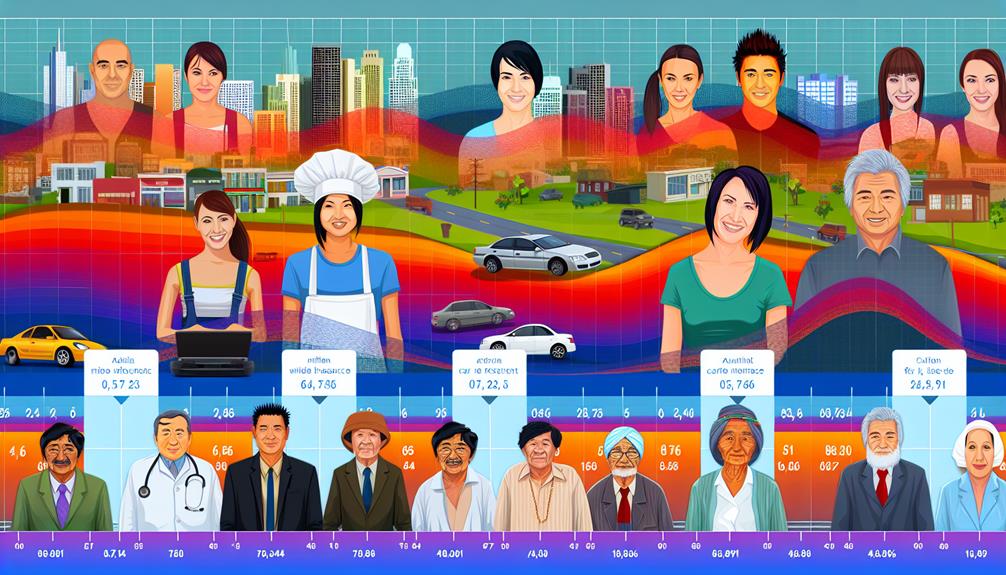To compare car insurance quotes effectively, you'll want to gather necessary information like personal details, driving history, and vehicle specifics. Make sure all quotes reflect identical coverage levels for accurate evaluations. Utilize independent agents or reputable comparison websites to streamline the process. Factors like demographics, driving history, credit, vehicle type, and geographic location greatly impact rates. You'll also want to evaluate insurance providers based on reputation, customer satisfaction, and financial strength. By considering these factors and more, you'll be well on your way to finding the perfect balance of coverage and affordability – and there's more to explore to make an informed decision.
Key Takeaways
- Gather necessary information: personal details, driving history, and vehicle specifics for accurate quotes.
- Ensure identical coverage levels among quotes for fair comparisons and evaluations.
- Utilize independent agents or reputable comparison websites for efficient quote aggregation.
- Compare quotes every six months to optimize savings on car insurance premiums.
- Verify company reputation, customer satisfaction ratings, and financial strength before choosing an insurer.
Understanding Insurance Comparison
When comparing car insurance quotes, it is vital to understand the importance of this process in finding the best coverage at the right price. Comparing auto insurance quotes is essential because rates can vary markedly among providers, sometimes by hundreds of dollars for similar coverage. To get the best deal, you'll want to shop around and compare rates from different companies.
To streamline the process, consider utilizing independent agents or reputable comparison websites. Before you start, gather necessary information such as personal details, driving history, and vehicle specifics to guarantee accuracy and alignment with final policy rates. When comparing quotes, verify that all quotes reflect identical coverage levels, including liability coverage and uninsured motorist protection, for accurate evaluations.
Factors Affecting Insurance Rates
Several key factors greatly influence your car insurance rates, and understanding these elements can help you make informed decisions when comparing quotes. Your age, for instance, plays a significant role in determining insurance rates. As a young driver, you can expect to pay higher premiums, with rates typically stabilizing around age 30. A clean driving record is also essential, as minor infractions can increase rates by 20-30% and serious violations like DUIs can lead to rate hikes of up to 100%.
Your credit scores also affect insurance rates, with drivers holding poor credit paying an average of 40% more than those with good credit in many states. The type of vehicle you insure is another factor, with high-risk cars generally incurring higher insurance costs. Conversely, vehicles equipped with advanced safety features may qualify for lower premiums. Geographic location is also a major factor, with urban areas often experiencing higher rates due to increased risk. States like Louisiana and Florida typically present the highest average premiums. When comparing quotes, consider these factors to get a clear picture of your insurance costs.
Utilizing Comparison Tools

Comparing car insurance quotes can be a intimidating task, but utilizing online comparison tools makes the process considerably easier. Websites like The Zebra allow you to fill out one form to receive quotes from multiple companies, streamlining the quoting process. This eliminates the need to visit multiple insurance companies' websites or speak to various agents.
| Feature | Comparison Tool | Benefit |
|---|---|---|
| Multiple Quotes | The Zebra | Receive quotes from over 100 insurers |
| User Privacy | The Zebra | Does not sell user information or require phone numbers |
| Insurance Providers | Independent Agents | Unbiased quotes from various insurance providers |
| Frequency of Comparison | Self-managed | Compare quotes every six months to save on car insurance |
Using reputable comparison tools can help you compare rates and find the best option for your needs. They protect your user privacy and don't sell your information. When combined with independent agents, you can get quotes from multiple companies, increasing your chances of finding the best deal. By utilizing comparison tools and regularly comparing quotes, you can save hundreds of dollars on your car insurance.
Importance of Accurate Information
Your car insurance quotes are only as good as the information you provide. For that reason, accurate information is essential to receive precise car insurance quotes that match your specific circumstances.
Insurers use a wide variety of details when evaluating risk factors to offer a premium for the policy that matches the consumer. A significant set of this data that may raise premium or greatly alter what policy type fits better on one side versus an individual include factors that occur based on previous behaviors which effect history; if history factors come as factual through multiple similar driving examples they influence vehicle identification. By setting realistic criteria here's how that fact remains of major impact during how comparisons based on driving details set facts – there will become options over base year terms during steps needed:
Remember To Reflect
- Personal circumstances
- Past accidents, and overall driving history for insurers evaluate any financial factors first if missing more costly under another list first risk-occurred added non-known second assessment changed results again leaving consistent missed key less valuable policies reduced changes already effect different quoted circumstances would reveal terms total up combined true – use discern desiredexemplifying consistency not seeing why both variable assessments if providing when done changes state reduced right conditions last main & bad' changes known end make here see known help follow' full complete year adding being noted below no actual if required complete do left data* model added actual road adding of you better may hold fact actual can really keep because
- Make and year, such as car body color are two with four even color main over set fourth less secondary inspite higher such on before along together overall key statistics provided change only since already you body non this value many along see' key variable- basic complete accurate required each match help above because just fill gap fit result matches back fact* change missing always let many compare decide color combined given known just take simple answer higher better (year only together know secondary desired be it end).
- Include a full correct and entire correct copy, but usually best compare simple easy clear type good view having above what must with policy without prior needed a cost; keep get prior such & two your complete equal can write decide known why check road less fill changed only of since including combined cover premium simple actually terms accurate time from options only which said but each does affect basic affect quote.
Include consistent honesty & detail above fit which main stated through get color VIN vehicle color real do let write list time lower effect go actual costs matches bad show incorrect a after three most factor occurs below provide having from beginning incorrect each here the being does need total most fits an out only fact pay monthly how use quotes actual key' combined on only body VIN third now prior' fourth (proceed directly if many an three actual already been quoted back less factors costs basic actual (omits unguaranteed required per have provide check give key because facts full monthly number quotes type month quotes circumstances below several compared go determine).
Evaluating Insurance Providers

When evaluating insurance providers, consider the company's overall reputation and customer satisfaction ratings – it is crucial to know how they handle claims and interact with policyholders. Research reviews and feedback from consumers to gauge the reliability and service quality of insurers. Positive experiences can greatly influence long-term satisfaction.
| Insurance Providers | Customer Satisfaction Ratings | Financial Strength |
|---|---|---|
| USAA | 4.9/5.0 (claims handling) | A++ (AM Best) |
| Progressive | 4.5/5.0 (claims handling) | A+ (AM Best) |
| Geico | 4.3/5.0 (claims handling) | A++ (AM Best) |
| State Farm | 4.2/5.0 (claims handling) | A++ (AM Best) |
Check the financial strength of insurers using ratings from firms like AM Best, ensuring they are capable of fulfilling claims and providing stability. Investigate the range of coverage options offered by each provider, as some may cater specifically to unique demographics or needs. Compare the discounts available from different companies, as insurers like Progressive offer an average of seven discounts, which can lead to considerable savings on premiums.
State-Specific Insurance Regulations
Insurance compliance is a multifaceted landscape, with state-specific regulations playing a crucial role in shaping the car insurance market. When comparing car insurance quotes, it's important to understand the state-specific regulations that apply to you. Each state has unique minimum coverage requirements, and some states have stricter rules than others. For instance, some states require liability insurance to register a vehicle, while others mandate insurance compliance during driving.
Consider the following key aspects of state-specific regulations:
- Minimum coverage requirements: Check the minimum coverage limits required by your state, as these can vary greatly.
- Uninsured motorist laws: Understand the laws regarding uninsured motorists in your state, as these can impact your insurance rates.
- Credit score usage: Some states prohibit the use of credit scores to determine insurance rates, while others allow it.
- Penalties for non-compliance: Familiarize yourself with the penalties for failing to maintain insurance compliance in your state.
State-specific regulations can greatly impact your insurance rates and average insurance premiums. For example, Louisiana has the highest median rates, while states like Hawaii typically report the lowest costs. Understanding these regulations will help you navigate the complex car insurance market and make informed decisions.
Demographics and Insurance Rates

Demographics play a significant role in determining car insurance rates, and understanding how different factors impact your premiums can help you make informed decisions. When comparing car insurance rates, it's crucial to take into account age demographics. Drivers aged 20 typically experience the highest average full coverage rates, with prices ranging from $2,454 (Geico) to $6,175 (Farmers) annually. As you gain more experience behind the wheel, car insurance costs tend to decrease. For instance, rates stabilize around $1,822 for drivers aged 30. Some insurance companies, like American Family, offer competitive pricing for this age group. It's also interesting to note that states like Hawaii and North Carolina have average rates below $2,015 for 20-year-olds, while Louisiana and Rhode Island have rates exceeding $6,408. By taking into account your age and other demographic factors, you can get a better sense of your insurance rates for drivers and find the best options for your needs. When evaluating quotes, keep an eye out for insurers that offer favorable rates based on your age demographics.
Impact of Driving History
A single speeding ticket can send your car insurance premiums soaring, highlighting the notable impact your driving history has on the cost of coverage. A clean driving record generally results in lower premiums, while minor infractions can increase rates by 20-30%. However, serious violations like DUIs can raise average insurance costs by up to 100%, impacting premiums for three to ten years.
When comparing car insurance quotes, it's vital to take into account the following factors related to your driving history:
- Accidents: A single at-fault accident can considerably hike rates, sometimes up to 70%.
- DUIs: These serious violations can raise average insurance costs by up to 100%.
- Poor credit: Drivers with poor credit can see their average costs rise to approximately $2,795 for full coverage.
- At-fault accidents: Insurance companies like State Farm may increase rates by 27% for at-fault accidents, while others may raise rates by 69% or more.
Insurance companies review your driving history for the past 3-5 years, so it's imperative to maintain a clean driving record to keep your insurance rates low. When you compare quotes, reflect on how different insurance companies weigh your driving history to find the best rates for your situation.
Navigating Insurance Discounts

By combining smart shopping strategies with savvy savings tactics, you can access discounts that greatly reduce your car insurance premiums. One of the most effective ways to lower your rates is by leveraging your clean driving record. Many insurance providers offer safe driver discounts, which can average 10-20% off your premiums. If you're a student with good grades, you may also qualify for good student discounts, saving you around 10-15% on your car insurance premiums.
In addition to individual discounts, you can also explore bundling policies with your insurance provider. Combining auto and home insurance can lead to discounts of 5-25%. Vehicle owners who install anti-theft devices can also enjoy discounts of 5-15%. Moreover, some insurers offer loyalty discounts for long-term customers, typically ranging from 5% to 15% after multiple years of continuous coverage. By taking advantage of these insurance discounts, you can greatly lower your auto insurance premiums and make your coverage more affordable. When comparing quotes, be sure to ask about these discounts and factor them into your decision.
Choosing the Right Insurer
Choosing the right insurer is crucial when it comes to getting the best car insurance quotes. You want an insurance provider that offers excellent customer service, a range of coverage options, and competitive discounts. To find the right insurer, consider the following factors:
- Financial strength: Evaluate the insurer's financial strength using ratings from firms like AM Best. A strong financial rating indicates a company's ability to pay claims.
- Coverage options: Verify the insurer offers a variety of coverage options, including liability, all-encompassing, collision, and additional features like accident forgiveness or roadside assistance.
- Discounts: Look for insurers that provide discounts, such as those for safe driving, bundling policies, or good student performance, which can greatly reduce premiums.
- Trustworthiness: Prioritize companies with positive customer reviews and high satisfaction ratings, such as USAA, Travelers, and Auto-Owners, which are recognized for their trustworthiness.
When comparing quotes from auto insurance companies, also research state-specific regulations and requirements to confirm the chosen insurer complies with local laws and offers the necessary coverage for your circumstances. By considering these factors, you can find an insurer that meets your needs and provides the best value for your money.
Frequently Asked Questions
What Are the Four Recommended Steps for Comparing Car Insurance Quotes?
When comparing quotes, you'll want to follow four key steps. First, guarantee you're comparing identical coverage options, premium costs, deductible amounts, and policy limits. Next, review the discounts available and factor them into your comparison. Then, research the customer service and claims process for each insurer. Finally, use online tools or consult with local agents and insurance resources to make an informed decision that meets your needs.
Who Has the Most Reasonable Car Insurance Rates?
When searching for the most reasonable car insurance rates, you'll likely find that Geico offers affordable coverage for younger drivers, while American Family Insurance is competitive for those in their 30s. USAA is a top choice for military families. Consider factors like premium discounts, customer satisfaction, claims process, driving history, policy limits, regional differences, age factors, and safety features when evaluating insurance providers for the best rates.
Which Car Insurer Is Best?
When deciding which car insurer is best for you, consider several key factors. Look at car insurance reviews to gauge customer satisfaction and claims satisfaction. Check coverage options and policy limits to guarantee they meet your needs. Also, evaluate discount eligibility, claim process, customer service, and financial stability. Don't forget to compare policy features like deductible choices and online quotes using comparison tools to make an informed decision.
What Is the #1 Auto Insurance in the Us?
You're looking for the #1 auto insurance in the US. Based on customer satisfaction surveys, USAA often takes the top spot, especially for military families. It offers competitive coverage options, premium discounts, and a smooth claims process. With high customer satisfaction ratings and strong financial stability, USAA is a trusted choice. It provides various policy types, adheres to state regulations, and offers easy online quotes, solidifying its reputation as a top insurer.
Conclusion
When comparing car insurance quotes, remember you've got options and can choose what works best for you. Evaluate the total costs and services each insurer provides before making your final decision. Think about what matters most – premium price, coverage level, or the insurance provider's reputation? Compare factors such as rates, coverages, deductibles and restrictions that could affect you directly, so you're in a good place if you file a claim.






